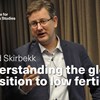fertilitet
Fertility and Relative Cohort Size
This paper estimates the effect of changes in population age structure on fertility through using the Easterlin/Macunovich mechanism. One finding is that as of yet, we do not have a sufficient theory
Swedish Fertility Swings and Public Expenditure for Children
This paper studies whether Swedish fertility swings and variation in public expenditure for children are related events. Amongst the results, there are indications that the age group 25-29 is most sen
Explaining Swedish Sibling Similarity in Fertility: Parental Fertility Behavior vs. Social Background
Demographic Research, 39(32): 884-893. DOI: 10.4054/DemRes.2018.39.32 Abstract Objective: The aim of this descriptive study is to determine which of the family-specific factors, parental fertility behav

Vegard Skirbekk: Understanding the global transition to low fertility
Globally, women are having half as many children as they had just fifty years ago. Why have birth rates fallen, and how will low fertility affect our shared future? The vast majority of current resear
What Future for Europe? New Perspectives in Post-Industrial Fertility Issues
After years of falling fertility, most countries of the EU have reached stabilization; however, at very different levels across Europe. Examining this difference may help in understanding the underlyi
Low Fertility and Long Run Growth in an Economy with a Large Public Sector
An important mechanism in low fertility countries is social interactions and its effects on ideal family size; as this is hard to capture in formal models, this paper uses an agent based simulation mo

Martin Kolk: Low-fertility countries are responsible for almost all of the CO2 emissions
Do we need to reduce population growth to address the climate challenge? From the perspective that each person contributes to green house gas emissions and resource consumption, it is a logical though
Fertility decisions – simulation in an agent-based model (IFSIM)
2009. New frontiers in Microsimulation Modelling, Part III. Eds A Zaidi, A Harding, P Williamson. Ashgate.
Research seminar with Vegard Skirbekk: Understanding the global transition to low fertility
Venue: Institutet för framtidsstudier, Holändargatan 13 i Stockholm Research seminar with Vegard Skirbekk, professor at Columbia Aging Center, Columbia University and senior researcher at the Norwegian I
Weak support for a U-shaped pattern between societal gender equality and fertility when comparing societies across time
Demographic Research, Volume 40 - Article 2, p. 27–48. Abstract Background:A number of recent theories in demography suggest a U-shaped relationship between gender equality and fertility. Fertility is t








